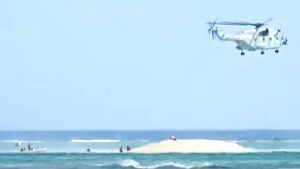
Manila: Filipino scientists harassed by Chinese chopper on Thitu Island
By John Victor D. Ordoñez, Reporter
A CHINESE People’s Liberation Army Navy helicopter harassed a team of Filipino scientists at Thitu Island on Saturday by hovering at a close distance to one of its sand bars, the Philippines said on Tuesday.
Some of the scientists and Bureau of Fisheries and Aquatic Resources (BFAR) crew suffered from cuts and scratches due to the strong wind and debris caused by the chopper, BFAR said in a statement.
The mission commander aborted the research work because of the incident. Thitu, which the Philippines calls Pag-asa Island, is the biggest contested island in the South China Sea. It lies about 300 miles (480 km) west of the Philippine province of Palawan.
This happened on the same day that a Chinese coast guard vessel fired a water cannon at a Philippine boat trying to bring food and other supplies to a grounded World War II-era ship at Second Thomas Shoal.
The Chinese Embassy in Manila did not immediately reply to a Viber message seeking comment.
The Philippines lodged a protest and said the boat was damaged and some crew injured. It later summoned China’s envoy in Manila to protest “aggressive actions” in the South China Sea. Beijing warned Manila to behave cautiously and seek dialogue.
South Korea’s Foreign Ministry on Tuesday expressed “grave concerns” over China’s recent use of water cannons against Philippine ships, saying it stokes tension in the South China Sea.
“We are gravely concerned about the recent and repeated use of water cannons in the South China Sea,” Seoul’s Foreign Ministry spokesman, Lim Soo-suk, told a news briefing.
“These actions increase tensions in the South China Sea, a major international navigation route used by all countries including Korea, and undermine efforts to maintain peace, stability, security and a rules-based maritime order,” he said.
He added that the freedom of navigation and overflight must be respected by all countries based on international law.
South Korea’s Yoon Suk Yeol government has been vocal about tensions in the South China Sea and the Taiwan Strait, saying it opposes attempts to change the status quo by force.
“We share your concern about China’s aggression with regard to many of the issues around the Philippines,” US Senator Kirsten Gillibrand told President Marcos during a courtesy call in Manila on Tuesday, based on an e-mailed transcript sent by the Presidential Communications Office.
“We stand with you, and we want to continue to stand by you, and with you, and to push that aggression back appropriately.”
INDIA TIES
Meanwhile, India wants to boost maritime security ties with the Philippines, Manila’s Department of Foreign Affairs (DFA) said on Tuesday.
The two countries have agreed to hold a dialogue on sea cooperation and security later this year, Philippine Foreign Affairs Secretary Enrique A. Manalo told a news briefing after meeting with his Indian counterpart Subrahmanyam Jaishankar in Manila.
“Our countries have a shared interest in a free, open and inclusive Indo-Pacific region,” he said.
Filipino and Indian maritime experts discussed prospects for stronger maritime ties at a meeting in September.
“We regard it as the constitution of the seas,” Mr. Jaishankar said at the same briefing, referring to the United Nations Convention on the Law on the Sea. “Two, we believe that all parties must adhere to it, as I said, in its entirety, both in letter and spirit.”
The Indian minister was set to meet with Philippine President Ferdinand R. Marcos, Jr. and Defense Secretary Gilberto C. Teodoro, Jr. later in the day.
Tensions between the Philippines and China have worsened in the past year as China’s coast guard continues to block Philippine resupply missions to Second Thomas Shoal.
The shoal is about 200 kilometers from the Philippine island of Palawan and more than 1,000 kilometers from China’s nearest major landmass, Hainan Island.
The maritime dialogue between India and the Philippines seeks to explore what else both nations can do, Mr. Jaishankar said. “At the end of the day, every country has the right to uphold and enforce its natural sovereignty. And I think that is something that we have also discussed.”
The Indian Coast Guard ship Samudra Paheredar is in Manila for a four-day port call and its officials will meet with their Philippine counterparts to discuss maritime cooperation, India’s top envoy said.
India, one of the world’s fastest-growing economies and the most populous country in the world, has expressed support for a 2016 arbitral ruling by a United Nations-backed tribunal in the Hague that voided China’s claim to more than 80% of the South China Sea.
In the ruling, the five-member court ruled China had violated Philippine sovereign rights in its exclusive economic zone by building artificial islands and failing to prevent its citizens from fishing in the zone.
Relations between India and China have been complicated by a border clash in 2020 that led to the deaths of at least 20 Indian soldiers.
China published a new 10-dash line map on Aug. 28 last year that covers regions beyond its borders. The Philippines and India had filed separate protests against the map.
The map also shows as being part of China the Indian state of Arunachal Pradesh, where Beijing fought a border war in 1962, and the Aksai Chin plateau, which links Tibet to western China.
“As two seafaring nations of the Indo-Pacific, our maritime cooperation holds great potential,” Mr. Jaishankar said. “Secretary Manalo and I have discussed our shared interests in ensuring maritime safety given that our two countries contribute so much to the global shipping industry.” — with Norman P. Aquino and Reuters



